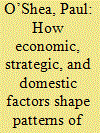|
|
|
Sort Order |
|
|
|
Items / Page
|
|
|
|
|
|
|
| Srl | Item |
| 1 |
ID:
137216


|
|
|
|
|
| Summary/Abstract |
The nature of food risk in Japan has undergone a qualitative change in recent years. This article synthesises insights from psychology, economics, and political science into an interdisciplinary risk approach to show how international relations impact consumer decisions in Japan by outlining how food risks are constructed and framed within existing narrative frameworks. To this end, the article employs two case studies: the gyōza incident in 2008, when poisoned dumplings imported from China caused ten people to fall ill, and contaminated beef incident in 2011, in which five people died and dozens more were hospitalised after consuming raw beef tainted due to industrial negligence. These cases are analysed in the context of Japan's low rate of food self-sufficiency, deteriorating Sino-Japanese relations and the ‘China threat theory’, and perceptions of food safety. The article shows how, despite suffering recent major domestic food contamination incidents and lethal domestic food terrorism, Japanese food is perceived as safe and healthy whereas imported food, and especially Chinese food, is perceived as dangerous and unhealthy. This is exemplified in the domestic response to the two cases: the gyōza incident led to a national outcry, mass hysteria, and calls for a ban on Chinese food imports. Conversely, the raw beef contamination incident – the deadliest case of food contamination in Japan since the 1990s – saw a far more mixed response, as industry, media, and consumers called for the government to allow individuals to take on self-responsibility to mediate their own risks regarding (domestically produced Japanese) food. The article concludes by pointing out that, while behavioural sciences can tell us important things about risk, the political and international context must also be considered.
|
|
|
|
|
|
|
|
|
|
|
|
|
|
|
|
| 2 |
ID:
140410


|
|
|
|
|
| Summary/Abstract |
Despite frequent talk of conflict and even war, economic and strategic factors suggest that the Sino–Japanese dispute over the East China Sea will not erupt into hot conflict, at least for the time being. However, for domestic reasons, overt cooperation remains a distant prospect.
|
|
|
|
|
|
|
|
|
|
|
|
|
|
|
|
|
|
|
|
|